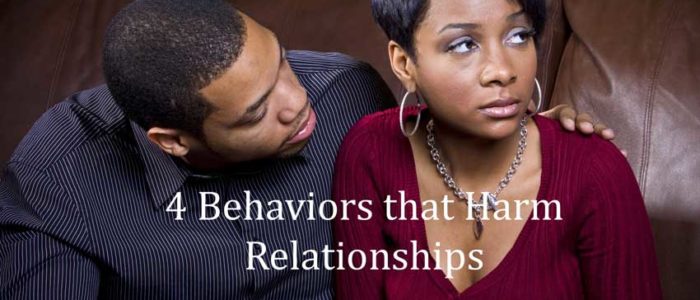4 Behaviors that Harm Relationships
The Four Horsemen of the Apocalypse – Behaviors that Harm Marriage Relationships
John Gottman, one of the top marriage researchers in the world, researched marriages by watching couples in a lab. He got so that he could predict divorce with a very high degree of accuracy. He defined four poor behaviors that he calls “The Four Horseman of the Apocalypse.” The more these occur in a relationship, the more likely the couple is to be unhappy.
I like this because as a mentor because it helps me to define and explain behaviors that are harming a couple’s relationship. As a couple, the more you can recognize these behaviors and change them, the better shot you have at improving your communication.
We’ve met with so many couples that don’t recognize what they are doing to tear their relationship down. They just know their relationship doesn’t work.
I think that we have all done these behaviors. At least, I know that I have. The issue is how do we recognize when we are doing them and try to change?
Helping the couple to identify these four behaviors helps them to choose different actions.
Criticism Vs. Complaints
Criticism is all about attacking your partner’s personality or character. It puts the other person down by insinuating that they are below you in some way.
Often criticism also includes overall judgements and can include such phrases such as “you always” or “you never”.
A complaint, on the other hand, is a legitimate way to express your displeasure. The two are very different.
Criticism: “I can’t believe that you didn’t wash the dishes. You are so irresponsible.”
Complaint: “I feel irritated when you don’t do the dishes.”
Criticism: “Pick up your towel. You always leave it on the floor.”
Complaint: “I feel that you don’t respect me when you leave your towel on the floor.”
Complaints communicate something we don’t like. Criticism is about putting the other person down.
Defensiveness
When we are criticized, it’s common to reply with defensiveness. Defensiveness is when we don’t accept responsibility for our actions. Often, there is a counter-attack.
“I washed the dishes last night. When are you going to clean the kitchen?”
“I don’t always leave my town on the floor. Besides, you leave your stuff out all the time.”
Defending is about not taking responsibility for our actions.
Contempt
Contempt is one of the most dangerous of behaviors. Contempt is a lack of respect. If you are found in contempt of court, it means you didn’t respect the court. In some ways, it’s the opposite of respect.
It can be verbal, such as replying with sarcasm.
“Oh really, like you’re so responsible.”
It can also be non-verbal, like rolling your eyes or shaking your head.
We’ve seen some couples that are so good at this, it’s entertaining. Their sarcasm is witty and funny, so they think it’s OK. Actually, it’s tearing down their relationship because they aren’t being taken seriously by their partner.
Stonewalling
Stonewalling is when one partner withdraws from an interaction. They stop responding. They may leave the room or they may sit there and not react. It’s like you are talking to a stonewall. Someone’s not responding at all.
This can look very calm – no one is escalating and argument. But, it’s a very dangerous behavior that shuts down communication and allows unresolved issues to continue. Eventually, that leads to resentment and disconnection.
I often contrast stonewalling with taking a time out. When we are triggered and the argument gets heated, it’s often helpful to take a 20 or 30 minute break to allow both people to come back. This is a healthy behavior, as long as you actually come back to the issue.
Taking a time out is healthy. Stonewalling is not healthy.
Conclusion
As a mentor, being able to help a couple to recognize these behaviors is an important part of what we do. I’ve found it’s easier to see them in someone else than it is to see them in ourselves.
When we first started mentoring, we read some of John Gottman’s books. It was helpful to us to put names to some of these behaviors.
As we explained them to couples, it helped them to recognize their poor behaviors and allows them to make better choices.
Help a Couple to Recognize:
- Criticism – Putting someone down.
- Defensiveness – Not taking responsibility for our actions.
- Contempt – Not treating someone with respect.
- Stonewalling – Shutting down and not dealing with something.
The more often that couples engage in these behaviors, the likely they will have an unhappy marriage.
Resources:
Gottman, John Mordechai., Julie Schwartz. Gottman, and Joan DeClaire. Ten lessons to transform your marriage: America’s love lab experts share their strategies for strengthening your relationship. New York: Three Rivers Press, 2007. Print.





Very good information and quite eye opening.A good source of easy to understand applications.
Thanks. I try to be easy to understand. Please let me know if I say anything confusing or unclear!